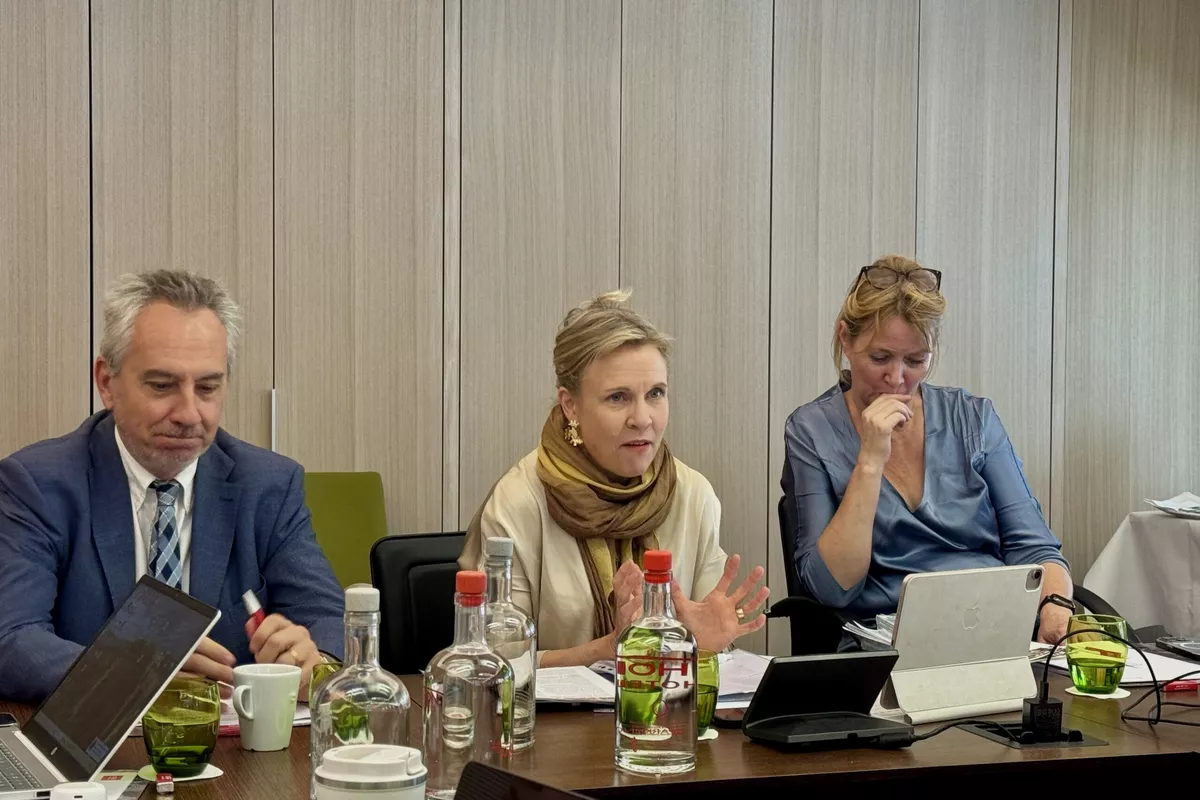
Pilvi Torsti in the middle. Photo credit: Assel Satubaldina/ The Astana Times
Education has played a central role in the relationship between the European Union (EU) and Central Asia. Pilvi Torsti, director of the European Training Foundation-an EU agency that supports education and training reform-stressed that investing in education and skills should take precedence over major infrastructure projects.
While infrastructure and connectivity projects often take the spotlight in EU-Central Asia relations, it is the investment in human capital that may prove the most transformative in the long run, The Caspian Post reports citing The Astana Times.
“We have been working in your countries all the time the ETF has existed, and that’s 30 years. It’s very long-term work with long-term connections,” said Torsti during her meeting with Central Asian journalists in Brussels on June 10.
ETF, an EU agency based in Turin, has worked with Kazakhstan since 1995 in developing education and training to boost employability, increase access to opportunities and promote social cohesion, complementing the work of the European Commission and the EU’s External Action Service.
“We divide our work into three services. We do monitoring and analysis, and that’s of the current state of education, labor market systems, and data. What are the education levels and employment levels, particularly in vocational education? Then, we have knowledge and foresight. What skills are needed today and tomorrow, how the digital and green transition is affecting labour forces and the education sector,” Torsti explained.
ETF also offers policy advice. “That means working with the governments where we work, and different stakeholders in those countries,” she added.
Torsti highlighted the DARYA project as the EU’s key educational initiative in Central Asia. Launched in 2022, it is a 10 million euro (US$11.4 million) program that supports the development of inclusive skills relevant to labour market needs for young people in the Central Asian countries.
By coincidence, the name DARYA, short for Dialogue and Action for Resourceful Youth in Central Asia, translates as “river” in regional languages, which reflects the steady flow of ideas, growth, and cross-border connection that the initiative aims to inspire.
“It is the first human capital development project of the EU of this size in Central Asia. The idea was to bring all the knowledge and experience of ETF,” Torsti said.
While the program is still ongoing, Torsti has named two key strategic objectives.
“The first one is thematic. It is to enhance the quality and inclusivity of education, training and employment systems. The other strategic goal is more about a way of work, so to facilitate participatory dialogue on the national level, the regional level and as a region vis-a-vis the EU Commission and the European Union,” she said.
Addressing a room of journalists, Torsti, who is herself a journalist by education, underlined one key message: thinking of the skills component and capacity building in projects by design.
“It is an important message as well when there are massive infrastructure projects, for example, in the field of digital and green transition, unless they are combined with the human capital development dimension, the sustainability of those projects is at risk,” she said.
The ETF also plays a key role in supporting vocational education and training reforms in the region. Kazakhstan also bets big on developing vocational training in its partnership with the EU.
“In Kazakhstan, there are, actually, very large and ambitious works ongoing, both with the teachers and trainers through something called SCAFFOLD that teaches different competencies in green [sector], competencies in digital [sector]. We have hundreds of trainers, trained and working in different schools across the country. There have been the first 10 schools that have piloted some of the methods,” Torsti told The Astana Times.
This year, they expect 50 new schools to join the program. Torsti also mentioned the importance of investing in green skills. Torsti underscored the importance of vocational education in preparing the youth for the future and in transitioning workers from declining fossil fuel industries to emerging green and digital sectors.
She brought as an example a team from the Mangystau Region, who made it to the final of the 2025 ETF Green Skills Award. The award celebrates global initiatives that promote the transition to environmentally sustainable and inclusive societies.
The team, which includes Dossan Karashayev and Ainur Ondakhanova from the Mangystau Energy College, prepares a skilled workforce to power the green economy.
“So, reskilling and upskilling is very important, and that all happens through vocational education and training,” Torsti added.
In their joint statement following the EU-Central Asia summit in Samarkand in April, EU and Central Asia leaders confirmed the commitment to “intensify common efforts to deepen cooperation in the field of education, including vocational education and training/skills development.”
Addressing the summit, President Kassym-Jomart Tokayev emphasized that the EU has always been an important partner for Kazakhstan in the fields of science and education, called for expanding this cooperation, and proposed developing an Erasmus+ for Central Asia program focused on training specialists in key areas such as artificial intelligence, water resource management, and biotechnology.
Share on social media